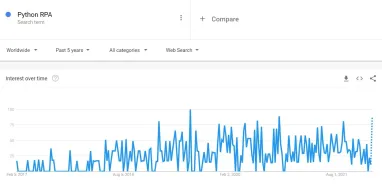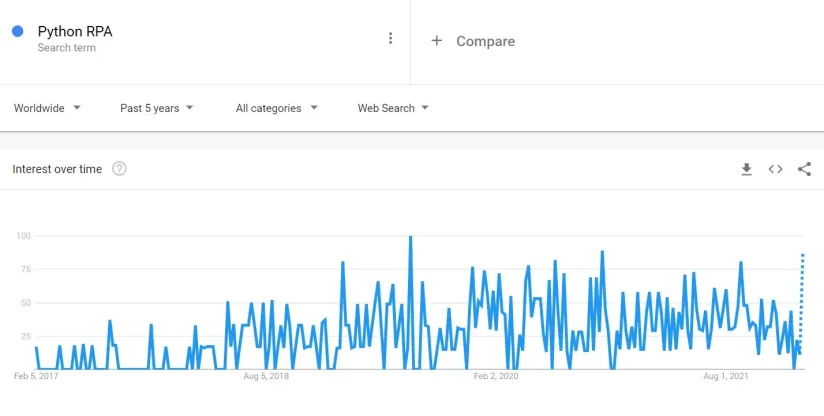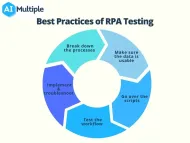Python RPA: 8 Benefits of Developing RPA With Python in 2024


The intersection of robotic process automation (RPA) and Python can revolutionize the intelligent automation landscape. Even though RPA software bots are useful across a wide range of industries, between 30-50% of the RPA implementation projects fail. 1
One challenge with RPA is that most RPA bots are built using drag & drop UIs and programming languages with waning or limited popularity like Visual Basic. Python is one of the most popular programming languages. With Python RPA tools, programmers can build bots using Python code and leverage numerous Python libraries and extensive integration capabilities with other applications.
This article outlines:
- What is Python RPA?
- 4 use cases of Python RPA
- 8 benefits of Python RPA
What is Python?
Python is an open-source programming language for creating f a flexible and versatile automation project. Python automation use cases include:
- Web scraping
- Data extraction
- Web browser automation
- System Administration and DevOps
- Financial analysis, and more.
These have made Python a darling amongst web developers, making it the #1 programming language from 2021 onwards (Figure 1).

Python has a wide range of libraries, in-built tools, and modules for different automation tasks. For example, the Pandas library can be used to automate data cleaning and data wrangling tasks, while the PyAutoGUI library can be used for GUI automation.
What is Python RPA?
Python RPA (Robotic Process Automation) is the concept of using Python programming language to create software robots that can automate repetitive, time-consuming tasks in business processes. RPA allows organizations to automate tasks that are typically performed by human workers, such as data entry, form filling image file move, and report generation.
Python is a popular language for RPA because of its simplicity, flexibility, and wide range of libraries and frameworks that make it easy to automate complex workflows. Python RPA typically involves the use of libraries, such as PyAutoGUI, allowing Python to simulate user input and interact with graphical user interfaces (GUIs). Another example could be BeautifulSoup, which is used for automated, web page scraping and data extraction.
What are the use cases of Python RPA?
Python can be used to create RPA bots to automate business processes. Python’s simple code and open source libraries make it a strong candidate for creating advanced intelligent applications. Specifically, use cases of Python and RPA include:
1. Creating RPA automation processes
Users can use Python packages to automate repetitive, time consuming tasks. For example, Python scripts can be used for doing web pages, creating customized bots from scratch for scraping a web page or manipulating elements in a file. Alternatively, Python’s data visualization libraries, such as Matplotlib and Seaborn, enable users to present large amounts of data in the form of charts and graphs.
2. Expanding RPA use cases
Some robotic process automation tools provide APIs that allow developers to access and integrate their Python code with the RPA software. This enables the bot to interact with external desktop applications to quickly automate complex, repeated tasks, such as querying a database, using files and accessing an API.
3. RPA analytics
Python can be used for data analysis and visualization in RPA processes for better project management. For example, Python scripts can be used to analyze both performance metrics human error, or generate reports on RPA process efficiency.
4. Machine learning
Python’s machine learning libraries, such as Scikit-Learn and TensorFlow, can be used to train bots to perform more complex tasks, such important tasks such as image recognition or natural language processing.
What are the benefits of Python RPA?
1. Easy to Learn and Use
The Python script is known for its simple syntax and readability, making it easy to learn and use for developers of all skill levels. With Python, developers can quickly develop and test RPA bots, reducing the deployment time.
2. Wide Range of Libraries and Modules
Python has a vast collection of libraries and modules that can be used to develop RPA bots, including libraries specifically for web scraping, data processing, and machine learning. These libraries provide a set of tools and functionalities that put programmers on the fast track for automating that make it easy for developers to automate repetitive and time-consuming tasks.
3. Cross-Platform Compatibility
Python is a cross-platform programming language. This makes it usable on different OS systems, such as Windows, macOS, and Linux. In extension, this makes it easy for businesses to define, deploy, and install RPA robots on various platforms.
However, note that the same applications written in Python might work well on one platform, but not in another. So there’s always the possibility of disintegration.
4. Scalable
Python is a scalable programming language that can be used to develop RPA bots of different sizes and complexities. This makes it an excellent choice for businesses looking to automate simple and complex tasks, as they can easily scale their automation efforts as their needs change.
5. Integration with Other Technologies
Python is compatible with many other technologies, making it easy to integrate with existing systems and applications. This integration enables developers to create customized automation workflows multiple tools that meet specific business needs.
6. Open-Source and Cost-Effective
Python is an open-source programming language, meaning each python package is free to use, edit, and distribute. This makes it an excellent choice for businesses looking to cut costs while developing RPA solutions. Additionally, the vast collection of open-source Python libraries and modules means that businesses can leverage existing solutions without having to develop their own from scratch.
7. Active Community
Python has a large and active community of developers who constantly contribute to the language’s growth and development. This means that there is a vast pool of resources, tutorials, and forums available to developers, making it easier for them to solve problems and develop RPA solutions quickly and efficiently.
8. Robustness
Python is a robust language that can handle a high volume of datasets and complex business processes. This is especially important for businesses that demand much needed flexibility and scalability from their RPA package.
For more on RPA
To learn more on RPA, feel free to read our comprehensive research on the topic:
- Top 10 Business Processes an RPA Chatbot Automates
- In-Depth Guide to the 5 Different Types of RPA
- RPA Can Mitigate Legacy System Integration Challenges
To explore RPA in detail, download our in-depth whitepaper on the topic:
And if you want to use an RPA solution to transform your business, check out our data-driven lists of RPA vendors and different automation solutions providers.
And reach out to us to guide you choose the right tool:
This article was originally written by former AIMultiple industry analyst Bardia Eshghi and reviewed by Cem Dilmegani
Sources
- 1. “Why Process Automation Initiatives Fail (And How Yours Can Succeed).” Forbes. October 12, 2021. Retrieved on July 11, 2023.

Cem has been the principal analyst at AIMultiple since 2017. AIMultiple informs hundreds of thousands of businesses (as per similarWeb) including 60% of Fortune 500 every month.
Cem's work has been cited by leading global publications including Business Insider, Forbes, Washington Post, global firms like Deloitte, HPE, NGOs like World Economic Forum and supranational organizations like European Commission. You can see more reputable companies and media that referenced AIMultiple.
Throughout his career, Cem served as a tech consultant, tech buyer and tech entrepreneur. He advised businesses on their enterprise software, automation, cloud, AI / ML and other technology related decisions at McKinsey & Company and Altman Solon for more than a decade. He also published a McKinsey report on digitalization.
He led technology strategy and procurement of a telco while reporting to the CEO. He has also led commercial growth of deep tech company Hypatos that reached a 7 digit annual recurring revenue and a 9 digit valuation from 0 within 2 years. Cem's work in Hypatos was covered by leading technology publications like TechCrunch and Business Insider.
Cem regularly speaks at international technology conferences. He graduated from Bogazici University as a computer engineer and holds an MBA from Columbia Business School.
To stay up-to-date on B2B tech & accelerate your enterprise:
Follow onNext to Read
What is Python RPA Library & Top 7 Vendors in 2024
Top RPA Tools For Python Developers in 2024
RPA Incident Management: 5 IT Metrics RPA Can Improve in '24
Thank you for interesting reading! If I may I would add another RPA tool with Python scripting. It is UltimateRPA that has both commercial and non-comercial licence.
Hi Michal! thanks for the heads up! They can sign up @ https://grow.aimultiple.com to get listed.


Comments
Your email address will not be published. All fields are required.